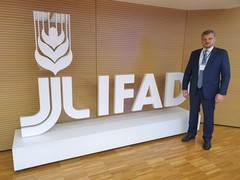Every third agricultural enterprise in Ukraine has closed since the outbreak of the war

The Ukrainian Agrarian Confederation assures that "growing corn and wheat is no longer profitable"
Excessively high logistics costs caused by continued Russian attacks on key export routes and other consequences of the invasion continue to hit Ukrainian agricultural producers.
The general director of one of the main associations in the agricultural sector, Pavlo Koval, told EFE that this situation forces many to leave this sector.
"We knew a lot would go wrong. But we did not expect that a third of the enterprises in the field of agriculture, forestry and fisheries would leave the market", the general director of the Ukrainian Agrarian Confederation, Pavlo Koval says.
Given how high the pressure on producers remains, he expects another 10-20% to follow the same path by the end of the crop year.
Small producers are the most affected, while large companies have bigger "financial cushions" to survive. However, he warns, that if next year everything remains the same, the consequences may become "critical" for them as well.
The situation is atypical for Ukraine, which before the invasion was a major exporter of grain: 70 million tons were sent abroad annually, while only a small percentage was consumed within its borders.
The problems created by the Russian invasion are so numerous that it is impossible to list them all, Koval emphasizes.
One of the problems is that the mobilization of men deprives the agricultural sector of labour. Another problem is that it can take decades before the huge minefields that make part of the agricultural area currently unusable are cleared.
Added to this are high logistics costs, a shortage of financial resources and low grain prices, which are among the most pressing problems.
115 grain ships have left Odesa since August via the new Black Sea corridor, launched after Russia pulled out of the UN-backed grain deal. However, the capacity of this corridor does not meet the needs of exporters and consumers.
Since July, a total of about 11 million tons of grain have been exported through this corridor, from Ukrainian ports on the Danube and by land transport, which is 30% less than in the same period last year.
Since there are fewer routes to take grain out of the country, prices for transportation within Ukraine remain too high, reducing producers' margins and increasing insurance and freight costs.
"It is no longer profitable to grow corn and wheat," Koval emphasizes.
Reduced exports also mean more grain needs to be stored in Ukraine, limiting the space available for future soybean and corn crops.
"Some elevators were destroyed by Russia, while others remain occupied," explains Koval.
As a result, some growers postpone harvesting in the hope that the situation will improve in winter or spring, while others leave their fields fallow.
Grain quality also suffers, as many farmers are unable to purchase the necessary fertilizers.
The negative consequences will most likely accumulate, and the impact will go beyond the borders of Ukraine, warns Koval. "Ukraine is losing its markets in Asia to other players, including Russia, which sells Ukrainian grain stolen from the occupied territories," he notes.
But although Ukrainian grain can be replaced in quantity, prices for alternatives are high. This affects countries that, even before the invasion, could barely afford to import food.
Koval also believes that both Ukraine and the EU could do more to maximize the carrying capacity of the "solidarity corridors" created in May 2022 to facilitate exports across the western border.
Despite some improvements, the infrastructure has not evolved on a regular basis, adding to the unpredictability already faced by manufacturers and traders.
However, neither these routes nor the Danube ports, which are regularly attacked by Russia and have an export capacity below two million tons per month, can reach the volumes that could be processed in seaports if they were protected from Russia, emphasizes Pavlo Koval.
IC UAC according to the Rostyslav Averchuk/EFEAGRO
- 2821 reads





